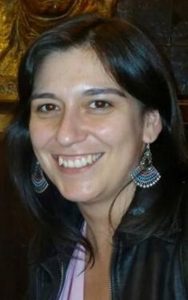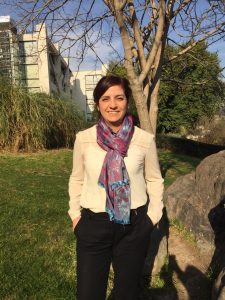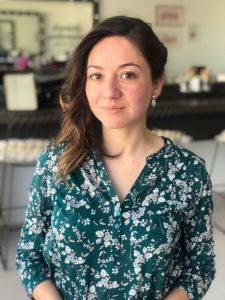Researchers ACCDiS lead nanotechnology pioneer in the country school

It's NanoAndes-2019, ninth version of this international school, for the third consecutive time, It will be led by women
In recent years, nanoscience has been opening road as a new area of research that allows us to study phenomena that occur at atomic level and that, because of its size, they were previously impossible to appreciate.
For this reason, the French National Center for scientific research - CNRS, by its acronym in French- It has carried out a series of partnerships with universities and institutions dedicated to science and technology in Latin America, shaping the NanoAndes to school, for the first time since its creation, It will be held in Chile.
NanoAndes will be held from 20 to 25 October 2019 at the premises of the Faculty of chemical and pharmaceutical sciences of the U. of Chile and will be sponsored by the Center for advanced chronic diseases (ACCDiS ) and the support of most universities, UTEM, USACH and UNAB.
The appointment also will bring together leading national and international scientific. Among them is Silke Krol, German researcher of the Carlo Besta Neurological Institute of Italy, those who work by applying nanotechnology and nanomaterials to provide solutions to problems relating to biomedicine.
Women in science
 In his last three versions, the central work of NanoAndes has been in the hands of women, and the first Chilean version is no exception, Since your organizing Committee is led by Ana Riveros, Research of ACCDiS and of the Faculty of chemical and pharmaceutical sciences of the U. of Chile.
In his last three versions, the central work of NanoAndes has been in the hands of women, and the first Chilean version is no exception, Since your organizing Committee is led by Ana Riveros, Research of ACCDiS and of the Faculty of chemical and pharmaceutical sciences of the U. of Chile.
"This invitation is a great challenge, It will be an international presentation window, that will allow us to show the excellent national scientific-academic preparation. Promoting the formation of advanced human capital which will foster cooperation and collaboration with peers from the region and Europe", says Riveros.
According to Daniela Báez, Research of ACCDIS and the Faculty of CiencIAS chemical and pharmaceutical the u. of Chile, "this year we will have the participation of a number of national and international researchers, whose presence confirms the relevance of the role of women in science. In addition, giving the same percentage of scholarships to participants of the event, we will promote gender equality".
 Despite the fact that it has made huge progress in the effective inclusion of women in science, There is still a long way to go for them. In this respect, the Director of the center of applied nanotechnology at the U. Mayor and member of the Organizing Committee of NanoAndes, María Belén Camarada points out that "at present we are faced with a world where the US is not valued and is stigmatized us on issues such as our intellectual capacity or to carry out a research project. Do not us it looks like a real scientific contribution. In addition, There are very few women that work in science, and there are much fewer in the area of nanotechnology".
Despite the fact that it has made huge progress in the effective inclusion of women in science, There is still a long way to go for them. In this respect, the Director of the center of applied nanotechnology at the U. Mayor and member of the Organizing Committee of NanoAndes, María Belén Camarada points out that "at present we are faced with a world where the US is not valued and is stigmatized us on issues such as our intellectual capacity or to carry out a research project. Do not us it looks like a real scientific contribution. In addition, There are very few women that work in science, and there are much fewer in the area of nanotechnology".
 For Daniela Baez, the main challenge is to continue to increase the visibility of women in science. "Less than 30% of the scientific researchers are women. These figures could improve if project funds are awarded proportionally, as well as also the hiring of senior managers in the scientific world. We could thus put an end to gender inequality that we are still facing".
For Daniela Baez, the main challenge is to continue to increase the visibility of women in science. "Less than 30% of the scientific researchers are women. These figures could improve if project funds are awarded proportionally, as well as also the hiring of senior managers in the scientific world. We could thus put an end to gender inequality that we are still facing".
"Women have achieved ourselves struggling in science with much effort, putting off even personal projects. This is a fight that we have given on an individual basis, without seeking support in our scientific peers, so the main challenge for us is come together and be a reference for society, promoting gender equity,"says Ana Riveros.
NanoAndes 2019 activities
NanoAndes annual meeting will carry out various activities, including theoretical and practical training in nanosciences under the supervision of renowned researchers, poster sessions, where will students have the opportunity to share their research, popular science lectures open to the community, and the NanoAndes Symposium, segment of the meeting in which visiting scholars will present their lines of research, which aims to share the State of research on nanosciences in Andean countries and develop cooperation with scientists from other regions of Latin America and Europe.
The ninth version of this school of nanotechnology is also being organized by researchers at the U. Chile and ACCDiS Valentina saw, Francisco Morales, Simon Guerrero, Javier Morales. Rounding out the Group Director of the school of biotechnology at the U. Wholesale, the researcher UTEM, Rodrigo Araya, the scientist from the U. San Sebastian de Concepción, Victor Manuel Diaz, researcher at the U. Chile Alvaro Olivera and the Assistant Professor of the U. Wholesale, Gabriel Abarca.
In addition, NanoAndes is a single instance that generates space and brings together students from Latin America so they can learn in a practical way what prestigious national and international researchers are conducting, encouraging new generations to continue developing concepts within the exciting world of the nano.
In this respect, María Belén Camarada pointed out that "it is an event that is going to allow work on the scope of nanotechnology, their applications and, In addition, Let us know as a country within the field of nanosciences".
